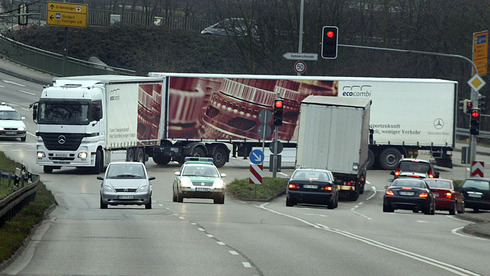
Will the Commission open the flood gates to megatrucks?
The Commission is hinting that it is about to announce a ‘re-interpretation’ of its rules on oversized lorries – so-called ‘megatrucks’ or ‘gigaliners’ – that could amount to the green light for the controversial vehicles. The transport commissioner Siim Kallas was going to announce the move at a road lobby conference late last month, but held back following angry reactions from MEPs and environmental groups. T&E says the re-interpretation would open the flood gates to megatrucks and set back attempts to reinvigorate rail freight.
The EU’s current rules for international transport say no lorry can be longer than 18.75 metres or have a fully laden weight greater than 40 tonnes. But the road industry is pushing for 25-metre megatrucks to be allowed onto Europe’s roads. The rules on lorry weights and dimensions were changed to allow trials of megatrucks, but only within the borders of member states – cross-border use of megatrucks is still against EU rules, despite reports of transnational megatruck traffic.
Now the Commission is toying with a change in legal interpretation of the text to the effect of allowing cross-border trials with megatrucks. Kallas was due to announce the re-interpretation at an International Road Transport Union conference on 29 February. But he withdrew his announcement following angry reactions from MEPs, member states and NGOs; a spokesman merely indicated that the Commission was taking arguments of ‘subsidiarity’ (EU-speak for letting national governments decide) on cross-border traffic very seriously. Further clarifications might come later this month when he addresses the European Parliament’s transport committee.
MEPs are angry that allowing megatrucks via a legal re-interpretation and not a political process violates the co-decision procedure. It would also undermine a consultation the Commission has just carried out on revising the 1996 directive on lorry weights and dimensions, as the directive is due to be updated next year.
T&E’s director Jos Dings wrote to Kallas, strongly urging him to postpone any significant decision on megatrucks. The letter says any re-interpretation now would make the recent consultation ‘redundant’, it would undermine the principle of consultation with stakeholders, it would far exceed a simple clarification of the existing rules, and it would contradict the Commission’s assurance from 2010 that ‘cross-border trials [of megatrucks] are not in conformity with the provisions of the directive’.
T&E policy officer William Todts said: ‘The Commission’s decision has huge implications. The ban on the international use of megatrucks was the strongest bulwark European citizens had against their spread. If Kallas now says cross-border trials are allowed, this will almost inevitably lead to the widespread use of megatrucks all over the EU. Germany will do a deal with the Netherlands, which will put Belgium under pressure, and a domino effect will lead to megatrucks being the default option across the continent. That won’t do any good for the environment, is very bad news for road safety, and would mark the end of ambitions to reinvigorate rail freight.’
Rail organisations say allowing megatrucks would lead to a 30% shift in freight from rail to road. Opinion polls carried out in Germany, France and the UK suggests three quarter of the population is opposed to larger trucks.
